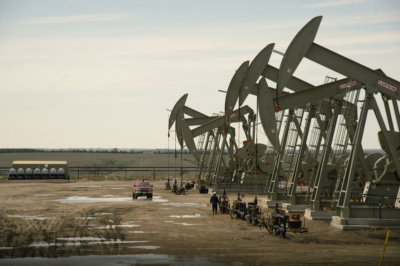NEWS ANALYSIS: Opposition politicians in the Norwegian Parliament are demanding answers from the Conservatives’ Oil Minister Tina Bru over how much (or how little) the government knew about Equinor’s huge losses on its US operations. Parties on both the left and right, however, have held political control of the oil ministry during the years when the state-owned oil company’s big spending and lack of control in the US cost it around NOK 200 billion. They thus share responsibility for the “scandal” that’s arisen.

“This was not nice to read,” Bru conceded after newspaper Dagens Næringsliv (DN)‘s lengthy reports on what commentators have called both an “industrial scandal” and an “investment scandal” at Equinor. It has lost roughly the same amount of money the country now needs to prop up the economy during the Corona crisis, and the losses weren’t just caused by a dive in oil prices.
DN documented how losses mounted after the company then called Statoil invested heavily in shale oil and shale gas operations, paid high prices to take over Brigham Exploration in 2011 along with other companies and wells, and lacked control over their operations. At the same time, Statoil’s US-based management in Houston was also spending heavily on marketing, promotion and not least its own employees, especially executives who were paid salaries and bonuses that Equinor now admits were unacceptably high.
The Norwegian state, through its ministry of business and trade, still owns 67 percent of Statoil/Equinor, making it the single-biggest shareholder in the large oil and energy company. That’s why there’s great public interest in Equinor, which also is by far Norway’s biggest and most powerful company with around 21,000 employees worldwide.
‘Surprised’
“Like most others, I was surprised by the (Statoil/Equinor’s) business culture (in Houston) and the criticism from its internal auditors,” Bru told DN over the weekend. “I expect that a company in which the state is a major shareholder, operates responsibly and has control. It’s good that Equinor itself thinks it has since cleaned up.”
Bru just took over as oil minister in January after the conservative Progress Party held the position since 2013. She couldn’t answer whether the ministry was aware of the extent of Equinor’s losses in the US over the past 20 years, but claimed it “was not aware of the lack of follow-up and internal control” at its US operations. “We know that it’s different and demanding to operate on land in the US (which Equinor itself refers to as “unconventional” oil and gas operations), but we didn’t know the extent of the challenges.”

She also noted how even though the state is Equinor’s biggest shareholder, it only receives the same information given all shareholders. “We have not had, nor should we have, access to the company’s internal reports,” Bru told DN. “They should be handled by the company and its board, and it’s their responsibility to have a good business culture and internal control.”
The state, which also has large investments in several other major Norwegian companies such as Telenor and Hydro, has long maintained a “hands-off” policy when it comes to management issues. While all companies are expected to adhere to Norwegian labour policy, the state has refrained from instructing companies even on controversial issues.
When Statoil, for example, first invested in highly controversial oil sands projects in Alberta, Canada, the Labour Party-led government at the time refused to intervene, and when Statoil complained about the high costs of a carbon-capture project at its Mongstad refinery, then-Prime Minister Jens Stoltenberg later dropped it even though he had famously referred to the project as Norway’s equivalent of a moon-landing. Stoltenberg’s government also opened up Arctic areas for oil exploration and production, despite huge protests from climate and environmental advocates.

Equinor is in principle bound by Norway’s trade and oil ministries, over which Labour and the Center Party (Labour’s former government partner) had political control from 2005 until 2013. Former oil ministers Terje Riis-Johansen of Labour and then Ola Borten Moe from the Center Party were in charge when Statoil first invested in the now-troubled shale oil projects. Moe, who has since gone into the oil business himself, also firmly supported Equinor’s controversial expansion into the Arctic, and was once called “the perfect minister” for oil because of his bullishness on the oil business and his desire to keep increasing Norway’s oil and gas production.
Both Labour and Center Party MPs are nonetheless criticizing Bru and the current Conservatives-led coalition government now over Equinor’s losses, even though they ran the ministries during the boom years when most all of Statoil’s US investments were made. Recent critics have also included Members of Parliament from the Progress Party that until recently shared government power with the Conservatives, and had political control of the Oil & Energy Ministry from 2013 until January 2020. All of Progress’ oil minister have been firmly pro-industry, from the Center Party’s Moe in the former left-center government to Progress’ Tord Lien, Terje Søviknes, Kjell-Børge Freiberg and Sylvi Listhaug.
Freiberg, Søviknes and Lien arguably should have known about then-Statoil’s trouble in the US, not least since the critical internal reports at Statoil started being issued within the company in 2014, when Lien was minister and then succeeded by Søviknes and Freiberg. Listhaug only served a month before the Progress Party withdrew from the government coalition in January.
Equinor’s expansion began under Labour
None of them ever seemed inclined to rein in Equinor, and it was Labour’s Stoltenberg who first opened the door for the former Statoil to expand internationally. When the state oil company was partially privatized and stocklisted in 2001, Stoltenberg was in his first term as prime minister and most keen on the “new” Statoil also being able to avoid any meddling by the state in its actual business affairs. Governments since then have continued the “hands-off” policy, and Bru told DN that there’s still no political majority in Parliament for the state to involve itself in the internal control of companies its owns.
Others disagree, and there’s been an ongoing debate over whether Equinor should now be split up and its international division sold off. Bru is skeptical, claiming that having both should give a company strength.
Meanwhile she must respond to the critics in Parliament who now seem to hold her responsible for Equinor’s most recent problems and losses. The Center and Labour parties support a call from its former government partner, the Socialist Left Party (SV), that Bru be summoned to Parliament to explain what went wrong at Equinor. SV, at least, is known for criticizing Statoil/Equinor in the past but never won support from the Labour and Center parties for its opposition to Arctic expansion or the ill-fated oil sands project in Canada.

Now SV, at least, can claim the most credibility in questioning how the current government has handled Equinor, with SV’s MP and finance policy spokesperson Kari Elisabeth Kaski telling DN that the Equinor case may be brought up before the Parliament’s disciplinary committee.
“This is a shocking case and a huge scandal that reveals a frightening company culture and a lack of cost control,” Kaski told DN. “This is our money that’s gone into partying, high executive pay and decadent lifestyles instead of dividends on investments, if you can call them investments. This should have consequences in the Parliament.”
Espen Barth Eide of Labour, meanwhile, now advocates a policy different from what his party practiced when it was in government, telling DN that Labour wants the state to be a “more active” owner of the companies in which it invests. “If I had been a member of Equinor’s board, I’d be uncomfortable now,” Eide told DN, “especially if I represented the state’s interests.” Kaski is also calling for more active ownership.
Equinor’s “scandal” comes just as the company and others in the oil industry also have been demanding tax relief to help offset the ill effects of the Corona crisis and the latest collapse in oil prices. Prime Minister Erna Solberg’s government was presenting its revised state budget to the Parliament on Tuesday, full of more Corona relief measures, but with an oil industry aid package not quite as generous as what the industry and its backers in Parliament want. Debate looms in the weeks ahead.
“If the politicians now hesitate to send a check to the oil companies after DN‘s stories about Equinor’s losses abroad, it would be understandable,” DN editorialized itself. “There can still be good arguments in favour of the tax package the government is putting forth to help the industry through a crisis.” Many are likely to agree, since oil has long been Norway’s most important industry. Offshore competence remains important as well, in the development of new industries from offshore wind energy to mineral extraction.
Tax relief and other assistance “must be offered in a manner that won’t leave taxpayers with a bill in the form of loss-generating projects in the future,” DN added. The NOK 200 billion Equinor lost in the North America is enough.”
NewsInEnglish.no/Nina Berglund

